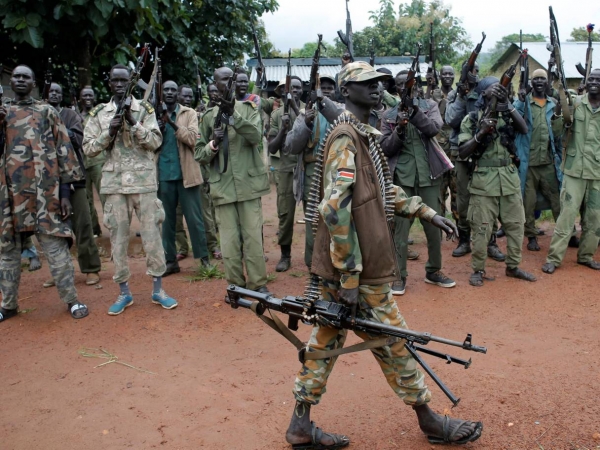7 November 2018
This is a presentation of “Violations and Abuses Against Civilians in Gbudue and Tambura States (Western Equatoria) April-August 2018”, released by the United Nations Mission in South Sudan on 18 October 2018.
The United Nations Mission in South Sudan (UNMISS) and the Office of the United Nations High Commissioner for Human Rights (OHCHR) jointly published a report detailing the abuse of civilians in Western Equatoria, South Sudan occurring between April through August 2018. This report was investigated by the UNMISS Human Rights Division (HRD) through increased surveillance by UNMISS human rights officers in the region and interviews conducted with 104 witnesses from 28 villages. The report was carried out in order to call attention to the human rights abuses occurring in this area, as well as to serve as a way to call for the groups involved to comply with international law.
Western Equatoria is located in western South Sudan, bordering both the Central African Republic and the Democratic Republic of the Congo. Since 2015, conflict has plagued this region. Initially, fighting mostly occurred between the Government-backed Sudan People’s Liberation Army (SPLA) and local armed defence groups. In 2016, the pro-Machar Sudan People’s Liberation Army in Opposition, or SPLA-IO (RM), fled to Western Equatoria, increasing fighting in the area. Although the SPLA-IO (RM) remained dormant in the area between mid-2017 and early 2018, commanders returned to the area in March 2018 with new military tactics, leading to intensified attacks against civilians. The SPLA has responded to the reemergence of the SPLA-IO (RM) in Western Equatoria through aggressive offensives.
From their investigation, UNMISS HRD established that the SPLA-IO (RM) carried out attacks either in an organized way or randomly. Organized attacks targeted specific villages or roads, while random attacks were opportunistic strikes against civilians by roaming SPLA-IO (RM) militants and groups. Over 887 villagers were abducted throughout these attacks.
Victim and witness accounts suggest that the SPLA-IO (RM) forced some abducted civilians into joining their forces. Reportedly, even children abductees, including boys under the age of 15 and girls over the age of 15, were provided basic military training. Enlistment was impossible to get out of unless civilians escaped captivity during training or fighting.
In addition to forced enlistment, SPLA-IO (RM) commanders and fighters sexually assaulted women and girls as a form of power. During attacks, UNMISS HRD reported 43 cases of rape or gang rape. The report details accounts of individual survivors, including one with a 15-year-old stating that, “I was very exhausted and in extreme pain and fainted after I was raped... When I regained consciousness, with difficulty, I forced myself up because my captors told me ‘the next time you will pretend fainting, we will rape you again.’”
The report’s scope also focused on villagers who were not abducted. The SPLA-IO (RM) violently abused civilians by beating them with machetes, gun butts, wooden sticks, and whips and looted civilian properties. The terror instilled in villages from these attacks forced civilians to flee their homes. SPLA-IO (RM) attacks also targeted humanitarian actors. For example, in May 2018, 10 humanitarian workers were held captive for four days.
In addition to the detailing of abuses by SPLA-IO (RM), the report also documented violations of international human rights and humanitarian law by SPLA. These incidents are grouped into the unlawful killing of civilians, unlawful destruction of properties, and forced displacements. On 20 May 2018, during a counter-offensive operation in Nagero led by the SPLA, at least 14 civilians were killed. Allegedly, three of these civilians were physically unable to flee the village and were burnt alive in their homes by SPLA elements. In the same operation, civilians reported that SPLA forces were responsible for unlawfully looting and burning their properties, as well as ransacking eight health facilities and five schools. Thousands of civilians were displaced from Nagero and surrounding areas to Tambura as a result of the operation. Later, the Governor of Tambura accused internally displaced persons (IDPs) of supporting SPLA-IO (RM) and moved them to a desolate location. The Governor then briefly blocked humanitarian aid from being delivered to that location.
In light of these findings, UNMISS and OHCHR insisted that all parties involved in the conflict “must abide by international human rights law and international humanitarian law.” They also urged the SPLA-IO (RM) to release all abducted civilians. Similarly, they called upon the Government of South Sudan to conduct an investigation into the allegations of international law violations and to provide assistance and protection for all victims, including adequate and full reparation.
Original report available here: https://www.ohchr.org/Documents/Countries/SS/ReportWesternEquatoria17Oct2018.pdf







